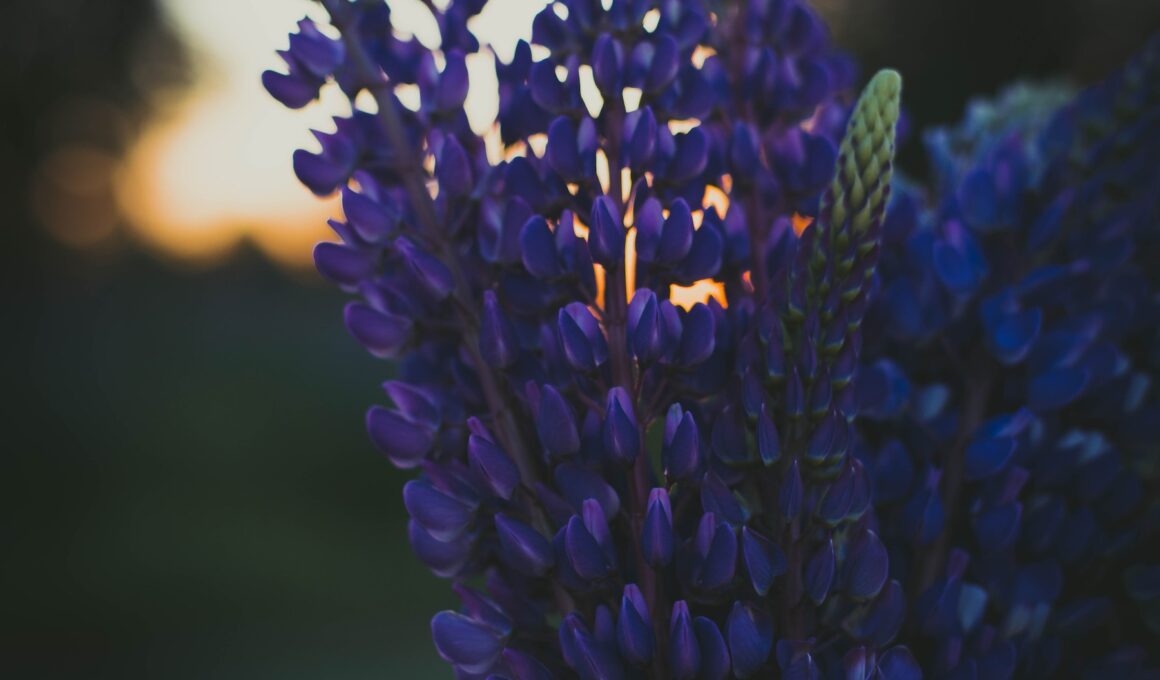Do you love growing lupins in your garden? These beautiful flowering plants can add a pop of color to any outdoor space and can attract bees and butterflies. But as a gardener, you know that there are a variety of pests that can damage your plants, including slugs.
Slugs can be a major problem for gardeners, as they can quickly eat through your plants and destroy your hard work. But do slugs eat lupins? In this article, we will explore the answer to this question and provide tips on how to protect your lupins from these slimy pests.
As a gardener, you want to ensure that your plants are healthy and safe from any potential threats. Slugs are common garden pests that can cause damage to a variety of plants, including vegetables, fruits, and flowers. But when it comes to lupins, you may be wondering if these plants are at risk from slugs.
Understanding the relationship between slugs and lupins is important for protecting your garden, and we are here to help. So, let’s dive into the world of lupins and slugs to help you keep your garden thriving.
Overview of Lupins as Garden Plants
Lupins are a popular choice for gardeners due to their vibrant colors and ability to attract pollinators. These plants come in a variety of colors, from blue to pink, and they’re easy to grow from seed.
If you want to grow lupins in your garden, it’s important to choose a spot that receives full sun, as these plants need at least six hours of direct sunlight each day. Lupins prefer well-drained soil, so make sure to amend the soil with compost or other organic matter before planting.
Growing lupins can be a rewarding experience, but there are a few common pests that you should be aware of. Aphids are a common problem, and they can be controlled by spraying the plants with a strong stream of water or applying an insecticidal soap. Slugs and snails can also be a problem, as they’re attracted to the tender foliage of young lupin plants.
To prevent slug damage, you can surround your plants with a barrier of copper tape or use slug pellets. If you want to keep your lupins healthy and thriving, there are a few growing tips that you should follow.
First, be sure to deadhead your plants regularly to encourage more blooms. Lupins also benefit from a mid-summer fertilizer application, as this can help promote vigorous growth and abundant flowers.
With proper care and attention, your lupins can be a beautiful addition to your garden for years to come.
Understanding Slugs
You’ll learn about these slimy creatures and their habits, which will help you understand how to protect your garden from unwanted visitors.
Slugs are notorious garden pests that can cause significant damage to your plants. They are slimy, soft-bodied creatures that move slowly, leaving behind a trail of mucus.
Slug behavior can be quite unpredictable. They can crawl up walls, trees, and even fences to reach higher ground. They are known to feed on a wide variety of plants, including lupins. Slugs can cause significant damage to your garden by eating through the leaves and stems of your plants.
However, there are natural slug repellents that you can use to protect your garden. For example, you can sprinkle coffee grounds or crushed eggshells around your plants to repel slugs. Additionally, you can plant herbs such as mint and thyme, which naturally repel slugs.
Protecting your garden from slugs requires a bit of effort, but it’s well worth it. By understanding slug behavior and using natural slug repellents, you can keep your plants safe and healthy. Remember to keep your garden clean and well-maintained, and remove any debris or decaying plant matter that slugs might be attracted to.
With a little bit of effort, you can enjoy a beautiful and healthy garden without the threat of these slimy pests.
Are Lupins One of the Plants That Slugs Hate?
Lupins are among the plants slugs despise due to their fuzzy leaves and tall stalks. Slugs dislike the rough texture of lupin leaves, making them less appealing for these slimy garden pests. By incorporating lupins into your garden, you can naturally deter slugs while adding beauty to your outdoor space.
Do Slugs Eat Lupins?
If you’re wondering what these slimy garden pests like to munch on, you may be surprised to find out what their palate includes. Slugs are notorious for their ability to devour any vegetation in their path. They aren’t picky eaters and will happily munch on your prized lupins if given the chance.
To prevent slugs from devouring your lupins, there are a few organic gardening methods you can try. Firstly, you can create a barrier around your plants using materials such as copper tape or crushed eggshells. Slugs dislike the sensation of copper and the sharp edges of crushed eggshells can deter them from crawling over it.
Secondly, you can try planting slug-repelling plants around your lupins, such as lavender or rosemary. These plants have natural oils that slugs dislike and can help to keep them at bay.
While slugs may seem like an unstoppable force, there are ways to prevent them from feasting on your lupins. By implementing some simple slug prevention methods and practicing organic gardening techniques, you can protect your plants and keep your garden looking healthy and vibrant.
So, don’t let these slimy pests get the best of you – take action and protect your garden today.
How to Protect Lupins from Slugs
To keep your garden healthy and vibrant, it’s essential to protect your plants from slimy pests like slugs. Learn how to prevent slug damage on your lupins with these organic gardening methods.
Slugs love to feast on lupins, and their presence can be detrimental to the health of your plants. However, there are natural remedies that you can use to keep these pests at bay.
One effective method is to create a barrier around your lupins. You can do this by placing a layer of sharp materials, such as eggshells or diatomaceous earth, around the base of your plants. These materials will deter slugs from crawling over them and reaching your lupins. Additionally, you can try using copper tape or wire around the edge of your planter to create a barrier that slugs cannot cross.
Chemical deterrents can also be effective in preventing slug damage. However, it’s important to use them sparingly and only as a last resort. One option is to use iron phosphate pellets, which are safe for pets and wildlife but toxic to slugs. Simply sprinkle the pellets around your lupins, and the slugs will consume them and die off.
Remember, prevention is key when it comes to protecting your lupins from slugs. So start implementing these methods as soon as possible. By using natural remedies and chemical deterrents, you can keep your lupins healthy and free from slug damage.
Remember to create a barrier around your plants and use iron phosphate pellets only as a last resort. With these organic gardening methods, you can enjoy a beautiful and healthy garden without the worry of slimy pests.
Conclusion and Additional Tips on Lupin Care
Take care of your lupins by implementing these additional tips on watering, fertilizing, and pruning to ensure they thrive and add beauty to your garden.
Lupins need regular watering, especially during the hot summer months. Make sure to water them deeply once a week instead of lightly every day. This encourages deep root growth, making them more resilient to droughts. Avoid getting the leaves wet to prevent diseases.
Besides watering, soil composition is also crucial to lupin care. They prefer well-drained soil with a pH range of 5.5 to 7.5. If your soil is too acidic, add lime to raise the pH level. On the other hand, if it’s too alkaline, add sulfur to lower it. Additionally, lupins need good drainage, so avoid planting them in clay soils.
Finally, pruning is essential to keep lupins healthy and encourage more blooms. After the first flowering, cut back the spent flower spikes to the base of the plant. This will promote a second flush of blooms later in the season. Additionally, remove any yellow or brown leaves to prevent the spread of diseases.
With these additional tips, you can ensure your lupins will thrive and add vibrant colors to your garden.
Frequently Asked Questions
What is the history of lupins as a garden plant?
If you’re a fan of gardening, you’ve probably come across lupins before. These beautiful plants have a rich history as a garden staple, with their popularity stretching back as far as the ancient Egyptians.
Lupins have a particularly strong cultural significance in the UK, where they are often associated with the countryside and traditional cottage gardens. Their tall, colourful spikes make them a favourite of gardeners looking to add some height and drama to their borders.
Despite their popularity, lupins can be vulnerable to pests such as slugs, so it’s important to take steps to protect them if you want to enjoy their beauty for years to come.
What are the benefits of planting lupins in a garden?
If you’re looking to add some color and life to your garden, you might want to consider planting lupins. These beautiful flowers not only come in a variety of colors, but they also have some great benefits for your garden.
For one, they make great companion plants, as they can help to improve the soil quality and attract beneficial pollinators. Plus, lupins are relatively easy to care for, so they’re a great choice for beginner gardeners.
So, if you want to add some beauty and life to your garden, consider planting some lupins. You won’t be disappointed!
What other pests besides slugs can damage lupins?
As a gardener, it’s important to be aware of common lupin pests and plant diseases that can damage your beautiful flowers.
Some of the most common pests you may encounter include aphids, spider mites, and thrips. These tiny insects can quickly multiply and cause damage to your lupin plants if not treated promptly.
In addition to pests, lupin plants can also be susceptible to diseases such as powdery mildew and root rot. To protect your lupin plants, it’s important to keep a close eye on them and address any issues as soon as they arise.
Regular pruning, watering, and fertilizing can also help keep your lupins healthy and strong. Remember, a little bit of prevention goes a long way in keeping your garden safe and thriving.
How do you properly care for and maintain lupin plants?
To properly care for and maintain lupin plants, it’s important to use proper pruning techniques and watering frequency.
Pruning should be done in the early spring, before new growth appears, to promote healthy growth and prevent disease. Remove any dead or damaged branches, as well as any branches that are crossing or rubbing against each other.
When it comes to watering, lupins prefer a consistently moist soil, but be careful not to overwater as this can lead to root rot. Water deeply once a week, or more frequently in hot, dry weather.
By following these simple steps, you can ensure that your lupins stay healthy and vibrant all season long.
Can lupins be grown in different soil types and climates?
Lupins are known for their adaptability challenges when it comes to different soil types and climates. They can grow in a range of soil types, from sandy to clay, and can tolerate both dry and wet conditions. However, they thrive best in well-draining soil that’s rich in nutrients.
Ideal locations for lupins include areas with full sun exposure and moderate temperatures, although they can also grow in partially shaded areas. When planting lupins, it’s important to ensure that the soil is well-prepared and that the plants are watered regularly.
With the right care and attention, lupins can be a beautiful addition to any garden, no matter the climate or soil type.
Conclusion
So, now you know that slugs can indeed eat lupins. However, there’s no need to despair as there are several ways to protect your lupins from these pesky creatures.
One effective method is to create a barrier around your plants using copper tape or wire mesh. You can also try using natural slug repellents such as coffee grounds or crushed eggshells.
Additionally, keeping your garden clean and free from debris can also help deter slugs from making a home near your lupins. By taking these steps, you can enjoy the beauty of lupins in your garden without having to worry about them becoming a slug feast.
Happy gardening!









